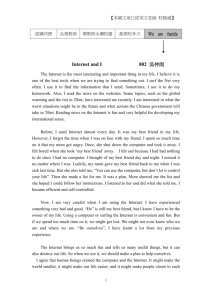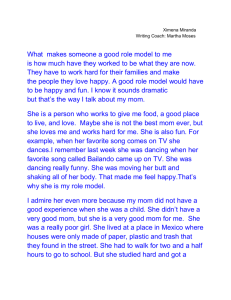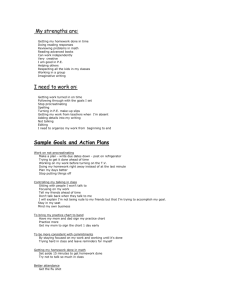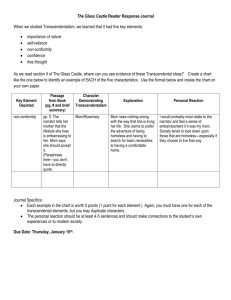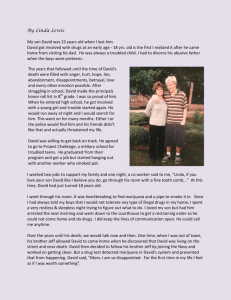Before-Comparative Essay. docx
advertisement
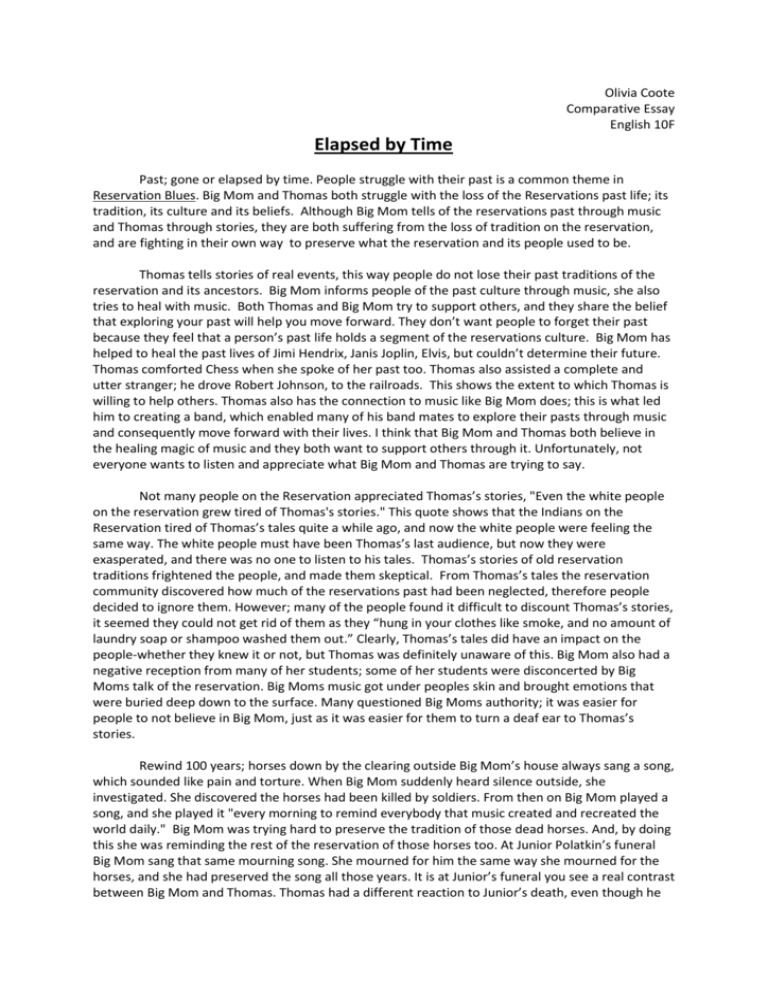
Olivia Coote Comparative Essay English 10F Elapsed by Time Past; gone or elapsed by time. People struggle with their past is a common theme in Reservation Blues. Big Mom and Thomas both struggle with the loss of the Reservations past life; its tradition, its culture and its beliefs. Although Big Mom tells of the reservations past through music and Thomas through stories, they are both suffering from the loss of tradition on the reservation, and are fighting in their own way to preserve what the reservation and its people used to be. Thomas tells stories of real events, this way people do not lose their past traditions of the reservation and its ancestors. Big Mom informs people of the past culture through music, she also tries to heal with music. Both Thomas and Big Mom try to support others, and they share the belief that exploring your past will help you move forward. They don’t want people to forget their past because they feel that a person’s past life holds a segment of the reservations culture. Big Mom has helped to heal the past lives of Jimi Hendrix, Janis Joplin, Elvis, but couldn’t determine their future. Thomas comforted Chess when she spoke of her past too. Thomas also assisted a complete and utter stranger; he drove Robert Johnson, to the railroads. This shows the extent to which Thomas is willing to help others. Thomas also has the connection to music like Big Mom does; this is what led him to creating a band, which enabled many of his band mates to explore their pasts through music and consequently move forward with their lives. I think that Big Mom and Thomas both believe in the healing magic of music and they both want to support others through it. Unfortunately, not everyone wants to listen and appreciate what Big Mom and Thomas are trying to say. Not many people on the Reservation appreciated Thomas’s stories, "Even the white people on the reservation grew tired of Thomas's stories." This quote shows that the Indians on the Reservation tired of Thomas’s tales quite a while ago, and now the white people were feeling the same way. The white people must have been Thomas’s last audience, but now they were exasperated, and there was no one to listen to his tales. Thomas’s stories of old reservation traditions frightened the people, and made them skeptical. From Thomas’s tales the reservation community discovered how much of the reservations past had been neglected, therefore people decided to ignore them. However; many of the people found it difficult to discount Thomas’s stories, it seemed they could not get rid of them as they “hung in your clothes like smoke, and no amount of laundry soap or shampoo washed them out.” Clearly, Thomas’s tales did have an impact on the people-whether they knew it or not, but Thomas was definitely unaware of this. Big Mom also had a negative reception from many of her students; some of her students were disconcerted by Big Moms talk of the reservation. Big Moms music got under peoples skin and brought emotions that were buried deep down to the surface. Many questioned Big Moms authority; it was easier for people to not believe in Big Mom, just as it was easier for them to turn a deaf ear to Thomas’s stories. Rewind 100 years; horses down by the clearing outside Big Mom’s house always sang a song, which sounded like pain and torture. When Big Mom suddenly heard silence outside, she investigated. She discovered the horses had been killed by soldiers. From then on Big Mom played a song, and she played it "every morning to remind everybody that music created and recreated the world daily." Big Mom was trying hard to preserve the tradition of those dead horses. And, by doing this she was reminding the rest of the reservation of those horses too. At Junior Polatkin’s funeral Big Mom sang that same mourning song. She mourned for him the same way she mourned for the horses, and she had preserved the song all those years. It is at Junior’s funeral you see a real contrast between Big Mom and Thomas. Thomas had a different reaction to Junior’s death, even though he was closer to Junior than Big Mom was. Thomas didn’t have the energy to sing or mourn properly. Big Mom never gives up but at this stage in the novel one can see cracks in Thomas’s faith in the reservations tradition. Thomas renounces and abandons the reservation. He realizes it is evident that no matter how many anecdotes he tells, people just aren’t interested. Leaving the reservation was a huge step for Thomas. He didn’t literally just give up and leave. He could have left a long time ago but he felt now was the right time. You see cracks in Big Mom’s resolve appear too; she gets angered that many of her students end up becoming drunks and start to self-destruct. Big Mom is determined to heal people with music and has seen that she can, but Thomas has not recognized the people he has helped through his stories, as most of the people on the reservation act like they don’t care. Overall, preserving the past is an unambiguous theme in the novel. Big Mom and Thomas are very forward in trying to perpetuate it; Thomas through storytelling and Big Mom through music. Both are very strong characters that are similar in the way they try to help people to preserve their past and the reservation to preserve its tradition; however, they didn’t have the support of the people on the reservation. This ultimately forced Thomas to leave the reservation he once cherished but Big mom still fights on to sustain the reservations tradition.


